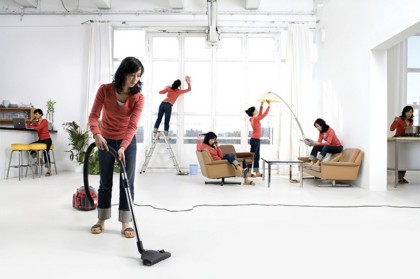
Imagine if the path to a more successful, happy and confident you was as simple as tidying your closet and folding your socks the right way.
Marie Kondo’s book, The Life-Changing Magic of Tidying Up, promises a dramatic improvement in lifestyle and mindset if you follow her de-cluttering and organisation strategies. If that’s not enough to get you excited, there’s more. The Japanese author also says you’ll never have to tidy again.
It’s no surprise that Kondo’s tidying manifesto has become a bestseller. Melbourne-based professional organiser Robyn Amott, who uses similar ideas to Kondo in her own work, says: “We’re very good at consuming, but we don’t necessarily understand how to maintain a level of balancein our homes. My clients often feel completely overwhelmed. No-one really teaches us how to be tidy.”
For those willing to learn, though, the possible rewards are enticing.
Happiness is next to tidiness
Losing weight, starting a dreamed-of business and improving sales are just some of the ways that Kondo says her clients’ lives have been transformed.
Clinical neuropsychologist Dr Ash Nayate says it’s not surprising that people report profound changes as a result of tidying, because it has the potential to affect every aspect of our life, including our career, finances and relationships.
While Kondo describes it as near mystical, Nayate offers a more scientific explanation. “The more we having going on around us, the more overload that places on our working memory. We have less cognitive resources available to deal with the other things we need to do like decision-making and problem-solving,” she says. “When we free up our working memory, we’re better able to make decisions, think things through properly and weigh up pros and cons. If our decisions improve, over time that adds up significantly.”
Renee Zaia, 36, is in the midst of a de-cluttering spree and says her Sydney home is now a sanctuary that provides a refuge from the corporate world she inhabits. “I have better clarity in making decisions and undertaking analyses in all areas of my life,” she says. “Life is simpler and more joyful just by having less.”
Monika Lee, 23, who describes herself as being “obsessed with organisation”, has a well-established system in place. Her label-maker works overtime, with even the closet of her Sydney home labelled by category. She credits her super-organised way of life as a big factor in her success – she’s already earning a six-figure income and owns two properties, all in her early 20s.
The science of clutter and chaos
Research suggests that clutter and lack of organisation really does mess with our brain. In a 2011 US study published in The Journal of Neuroscience, researchers at Princeton University used functional MRI and other techniques to track the response of the brain to cluttered visual stimulus.
Australian neuroscientist Dr Sarah McKay explains the results: “When objects were grouped rather than scattered, there was less competition between brain areas.
Or in other words, visual chaos makes it harder to focus because the brain is trying to process too many information streams.”
In a 2013 study published in the journal Psychological Science, researchers from the University of Minnesota randomly assigned participants to either a tidy room or a messy room and evaluated their subsequent behaviours. Those in the tidy room were more likely tochoose an apple rather than chocolate as a snack. When presented with an opportunity to donate money to a charity, the participants in the tidy room also donated more than twice as much as those in the messy room.
Even the simple act of keeping your bedroom tidy seems to have health benefits. A poll conducted by the National Sleep Foundation in the US found that those who make their bed every day or almost every day are more likely to say they get a good night’s sleep compared to those who make their bed less often.
Tips for tidying
Give things a home
To break out of the endless tidying cycle, each item needs a place to call home. Kondo has a storage place for each item in her handbag (which she empties every day).
Treat socks with respect
Is your sock drawer full of lumps that get pushed to the back? Kondo prefers to fold socks in pairs and stand them on edge so they fit the drawer’s height.
Stop procrastinating
Don’t underestimate how much you can get done in a short period of time. Amott says items often take up more time in our mind than the amount of time required to organise them.
Start by culling
Upend everything, from your handbag to your closet. Why? Kondo explains: “Because we should be choosing what we want to keep, not what we want to get rid of.”
Sort by category
Tidying by room is a common trap, so Kondo advises a categorised approach instead. Start with clothes and by the time you reach sentimental items, you’ll be an expert.
Ask yourself if it brings you joy
Kondo’s golden rule when deciding whether to keep something is: Hold each item in your hands and return only those things that “spark joy”.
Have a vision
Visualising the outcome you want can be useful, Amott says. If part of your vision is to have more time with your family, consider how much time each object may take away from that.
Discard unwanted gifts
If you don’t want a gift, get rid of it. You can still be thankful for the feeling it conveyed. Kondo adds that once you start tidying, you’ll know how many possessions you need.
Store vertically
Don’t stack items. Give them their own slot in a vertical storage container. Open Kondo’s fridge and you’ll even find the carrots stored vertically in drink holders.
Don’t be distracted by pretty storage
Amott says many people are distracted by attractive “storage solutions”, which aren’t really a solution at all. Focus on functionality.
Be buyer beware
We also need to control what we allow into our environment, Amott says. Think about how a potential purchase will fit with your vision rather than how it will fit into your house.
Source: bodyandSoul
 We are sharing information for knowledge. Presented by. SocialDiary.Net
We are sharing information for knowledge. Presented by. SocialDiary.Net



